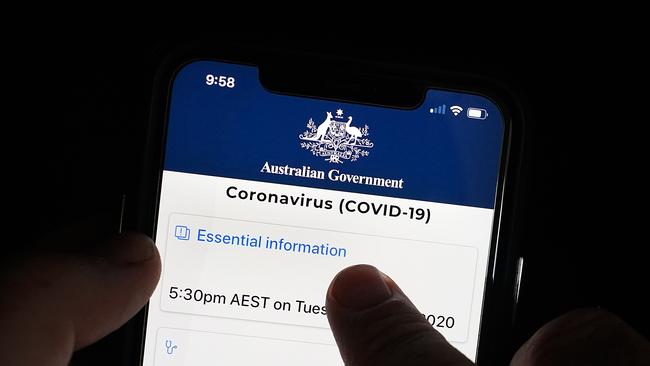Matt Smith: Even as a journalist the virus tracing app privacy’s no big bother
As a journalist the last thing I want to do is make it easier for governments to track my movements, writes Matt Smith, but the coronavirus tracing app is nothing to fear
Opinion
Don't miss out on the headlines from Opinion. Followed categories will be added to My News.
- No new cases again as SA hits testing milestone
- Latest subscriber-exclusive giveaways, specials and prizes
In these extraordinary times it is not unusual to find your mind wandering to former pleasures.
I’m thinking of a night with friends in an Adelaide laneway bar, an impromptu scouting mission to one of the world’s great wine regions or breakfast with the kids at a packed beachside cafe.
Many will find their mind wandering back to Adelaide Oval, watching their beloved footy team.

Each of these examples are a good reason to sign up to the COVID Trace phone app that the federal and state governments are pushing as part of the fight against the coronavirus.
But the last is the best example.
Because a packed Adelaide Oval is a pretty accurate representation of how many South Australians lost their jobs in just three weeks at a high point of coronavirus concerns.
Figures this week showed that about 44,000 South Australians lost their jobs in 21 days – and those numbers are expected to get worse.
Anything that could make it easier for us to return to life as it once was, and get those South Australians back in jobs, is surely worth embracing.
Before detailing what the app will do, it is important to acknowledge why there is concerns in the community, and from some within all sides of politics, about anything that could be seen as tracking individuals’ movements.
As a journalist who dedicates his days to documenting the actions of the politicians – both things they do and do not want in the public arena – the last thing I want to do is make it easier for governments to understand who I have been in contact with, and when.
And governments are asking us to sign up at a time when mistrust in many major institutions – from the banks, to the church to the parliament, is at record highs.
The robodebt debacle, some concerning treatment of whistleblowers and Australian Federal Police raids on the homes and offices of journalists add to the cynicism.
Both the federal and state governments are promising the app will be voluntary.
It will be subject to a Privacy Impact Assessment, the highest level of cyber security assurance, and is only available to health professionals for tracing purposes – or the “health detectives” tasked with contact tracing.
The data will be stored securely and anonymously on the mobile phone.
It is fully encrypted and cannot be accessed by anyone, including the user. The data of close contacts will only be shared with health authorities after an individual has tested positive for coronavirus.
In time, when restrictions are relaxed, South Australians could be at a cafe or a restaurant on a Saturday night only to develop symptoms and find out a week later they have tested positive to COVID-19.
Health authorities could then download the information from the app and determine if there was anyone else in proximity, for 15 minutes or more, who also had the app.
That could be one of your loved ones or friends.
And the more people with the app, the more people the health authorities can warn, which should in turn help to control any clusters, such as we have seen in the Barossa and Adelaide Airport.
MORE NEWS:
Call for return of surprise nursing home audits
Education bosses: “We’re ready for school on Monday”
‘Get control’: Radio hosts blow up at teachers’ union boss
That work is currently being done but without the digital footprint, which means contact trace detectives are relying on people’s memories on where they were and when.
If you are meeting someone you really don’t want anyone to know about, maybe leave your phone at home.
Premier Steven Marshall believes a strong sign-up in SA could help hasten relaxed restrictions. His political opponent, Labor leader Peter Malinauskas, will also sign up and encourage others to do so.
Australian Hotels Association SA chief Ian Horne said the use of the app would need to form an important part of any relaxing of social gathering – particularly for hotels, restaurants, bars and hospitality.
But if that is not enough, South Australians can turn to Professor Nicola Spurrier who has played a huge role in getting the state to the enviable position where we are today when compared with other states and countries.
In her words: “It will be incredibly helpful for us as a key part of us being able to do our contact tracing, because it will allow us to very quickly get hold of people if they’ve been in contact with a known case.
“That protects the individual but it also has a wider community protection as well. I am looking forward to having it in South Australia … For it to really work properly, it will need a large number of us to have it.”
